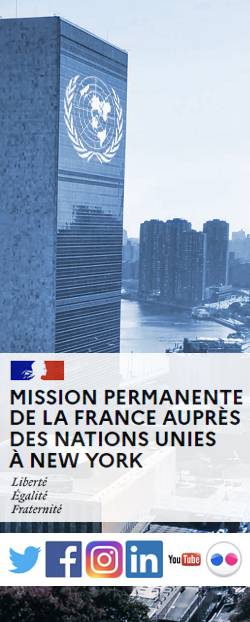Statements made by the Ministry for Europe and Foreign Affairs Spokesperson [Dec. 15, 2022]
Statements made by the Ministry for Europe and Foreign Affairs Spokesperson [Dec. 15, 2022]
Statements made by the Ministry for Europe and Foreign Affairs Spokesperson [Dec. 15, 2022]
SUMMARY
• Morocco – Visit by Catherine Colonna (Dec. 15-16, 2022)
• Meeting between Catherine Colonna and Dmitri Muratov, winner of the 2021 Nobel Peace Prize – (Dec. 14, 2022)
• Republic of Congo and Democratic Republic of Congo – Visit by Chrysoula Zacharopoulou (Dec. 18-22, 2022)
• Democratic Republic of Congo – Floods (Dec. 13, 2022)
• Iran – Iran’s removal from the UN Commission on the Status of Women (Dec. 14, 2022)
• Turkey – Sentencing of Istanbul Mayor Ekrem ?mamo?lu (Dec. 15, 2022)
• Lebanon – France condemns the attack on UNIFIL (Dec. 14, 2022)
• Lebanon
• China
• Burkina Faso
• Russia / Iran
• Peru

Metadata
Release date: December 15, 2022
Tag(s): Diplomacy, Foreign policy

Metadata
Release date: December 15, 2022
Tag(s): Diplomacy, Foreign policy

Morocco – Visit by Catherine Colonna (Dec. 15-16, 2022)
Minister for Europe and Foreign Affairs Catherine Colonna will be visiting Rabat from December 15-16.
The Minister will be welcomed by her counterpart, Nasser Bourette, Minister of Foreign Affairs, African Cooperation and Moroccan Expatriates. This meeting will give them the chance to discuss all aspects of the exceptional bilateral partnership between Morocco and France, which is characterized, above all, by very close, rich human ties spanning the Mediterranean. The two ministers will also discuss our two countries’ many economic ties, as well as regional and global issues of shared interest, in particular the Russian war of aggression in Ukraine and its consequences, including, first and foremost, food insecurity, which is having an especially deep impact on Africa.
The Minister will meet with representatives of the Moroccan business community and will visit the French Lycée Descartes in Rabat. She will visit the school’s Center for Arab Studies on World Arabic Language Day this December 18.
I would like to come back to Catherine Colonna’s trip to Rabat tomorrow. You mentioned the main topics that will be addressed tomorrow. Will the most sensitive topics be addressed? I’m thinking primarily of the issues around visas and Western Sahara. Will Paris possibly clarify its position tomorrow and, either way, will the Minister be discussing these topics?
Regarding Western Sahara, you know what our position is. Regarding the visa issue, of course this will also be addressed by the Minister. As you know, we have had numerous conversations about this with the Moroccan authorities. We have noted some very positive changes regarding readmission so this is something that the Minister will be raising with her counterpart.
Regarding Morocco and other topics having to do with France and Morocco that are sometimes controversial, will Pegasus be discussed, for example? Will Qatargate, which also involves Morocco, be discussed? Also, will the issue of Europe-bound migration be discussed, more generally speaking? And if so, how will these three issues be discussed?
We intend to discuss all these issues with trusted partners in the context of the exceptional partnership that we enjoy with Morocco. As I mentioned previously, this includes migration. As concerns the Pegasus case, as you know, there are legal proceedings underway, and it is not my place to comment on them. You also mentioned Qatargate. Based on the information that we have at this time, this is an extremely serious matter that has been brought before the courts, as you know. We hope that the fullest light will be shed on what appear to be particularly serious instances of corruption. You mentioned Morocco. We have no knowledge of any such conduct relating to this matter.
Meeting between Catherine Colonna and Dmitri Muratov, winner of the 2021 Nobel Peace Prize (Dec. 14, 2022)
Yesterday, the Ministry for Europe and Foreign Affairs welcomed Dmitri Muratov, co-founder and editor in chief of the independent Russian newspaper, Novaya Gazeta, and one of two winners of the 2021 Nobel Peace Prize, at an event attended by Reporters Without Borders (RSF). On December 12, Mr. Muratov opened the RSF Press Freedom Prize awards ceremony in Paris. The Minister reiterated her support for Novaya Gazeta, which is continuing its work despite pressure from the Russian authorities.
At a time when many Russian journalists are fighting under dangerous circumstances to preserve a free and independent press in Russia, France commends them on their excellence and courage and reaffirms its steadfast, determined commitment to freedom of the press, freedom of expression and protection for journalists throughout the world. The work of the independent Russian media is all the more essential given the need to enlighten Russian citizens and combat information manipulation in the context of the war in Ukraine. Access to free, reliable, and quality information constitutes an essential precondition for the effective functioning of democracies and the international system.
France stands with the journalists who have suffered from repression at the hands of the Russian authorities and once again calls on the Russian Federation to fulfil its international commitments regarding human rights and individual liberties.
Republic of Congo and Democratic Republic of Congo – Visit by Chrysoula Zacharopoulou (Dec. 18-22, 2022)
Chrysoula Zacharopoulou, Minister of State for Development, Francophonie and International Partnerships, attached to the Minister for Europe and Foreign Affairs, is traveling to the Republic of Congo and the Democratic Republic of Congo (DRC) from December 18-22.
In Brazzaville, the Minister of State will stress France’s desire to strengthen our cooperation on environmental conservation, especially in light of the One Forest Summit and youth training and infrastructure building efforts. She will visit several of this partnership’s emblematic projects and will take part in the signing of a funding agreement between the French Development Agency (AFD) and the Republic of Congo for a program on sustainable land use.
In Kinshasa, the Minister of State will reiterate to the Congolese authorities that France supports the DRC’s sovereignty and territorial integrity. She will also stress France’s solidarity following this week’s flooding. The visit will also be an opportunity to highlight our partnership on education and training, as well as the dialogue between France and the DRC as regards forest conservation, in light of the One Forest Summit, and cultural creation, in light of the 2023 African art forum. The Minister of State will meet with Congolese environmental activists and will visit a startup incubator as well as an arts center in Kinshasa. A roadmap on education and several AFD agreements will be signed.
Democratic Republic of Congo – Floods (Dec. 13, 2022)
Following the severe floods that took place in Kinshasa this past Tuesday, France assures the Congolese people of its support faced with the heavy toll taken by these floods, which have left over 100 dead.
France conveys its condolences to the families of the victims and assures the Democratic Republic of Congo of its full solidarity at this difficult time.
France is at the Democratic Republic of Congo’s disposal to provide disaster victims with humanitarian assistance.
Iran – Iran’s removal from the UN Commission on the Status of Women (Dec. 14, 2022)
Iran was removed yesterday from the UN Commission on the Status of Women following the adoption of a resolution that garnered 29 votes. France voted in favor of this resolution, as did a majority of nations represented on the Commission. In light of the Iranian authorities’ flagrant, systematic attacks on the rights of women and girls and the brutal crackdown they are being subjected to, we could not allow Iran to divert the Commission from its purpose: promoting women’s rights.
On December 10, Human Rights Day, the French and German foreign ministers awarded the 2022 Franco-German Prize for Human Rights and the Rule of Law to Mahsa Amini and women of Iran, who are defending freedom in their country. Iranian women remain strongly mobilized, and our own commitment to their legitimate aspirations remains steadfast.
France will continue to work closely with its partners to ensure that Iran is held accountable in all relevant fora, insofar as its compliance with its human rights commitments is concerned. We will pay close attention to the work of the fact-finding mission established by the UN Human Rights Council on November 24.
Turkey – Sentencing of Istanbul Mayor Ekrem ?mamo?lu (Dec. 15, 2022)
We were deeply troubled to learn that a Turkish court handed down a prison sentence against Istanbul Mayor Ekrem ?mamo?lu and banned him from political activity.
France reaffirms its commitment to the freedom of opinion and freedom of speech and reiterates the importance of complying with the rule of law in a democracy. We echo the EU Council’s call to Turkey in its conclusions on enlargement, adopted on December 13, to urgently reverse negative trends relating to the rule of law, democracy and respect for fundamental rights.
Lebanon – France condemns the attack on UNIFIL (Dec. 14, 2022)
France condemns the December 14th attack on the United Nations Interim Force in Lebanon (UNIFIL) in the strongest possible terms. This attack occurred near the southern town of Al-Aqbieh, and left one Irish peacekeeper dead and three others wounded.
France offers its condolences to the deceased soldier’s loved ones and to the Irish authorities. We wish the wounded peacekeepers a speedy recovery.
We urge calm and call for a prompt, unhindered investigation so that the perpetrators of this attack may be brought to justice. The safety of UNIFIL personnel and more broadly, the personnel of all peacekeeping operations, remains an absolute priority.
Ten parliamentary meetings have been held in the space of six weeks to elect a successor to Michel Aoun – so far, without success. No parliamentary agreement was reached and no new meetings have been scheduled. You said that Ms. Colonna would accompany President Macron to Amman. Even though it hasn’t been announced, could Beirut be included in that itinerary? Could there be a stop in Beirut? And could bilateral meetings in Amman touch on this issue in Lebanon?
I want to reiterate our concern over the power vacuum that has persisted in Lebanon since October 30. As you know, we are calling on Lebanese stakeholders to assume their responsibilities – and it is their responsibility – to revive their country’s economy and improve living conditions for the Lebanese. This requires holding presidential elections and enabling Lebanese institutions to once again operate smoothly and fully. With regard to Amman, President Macron will visit that city with the foreign minister. A briefing will be held at the Elysée. I won’t go into the details about this summit or its participants for that reason, but it is obvious – in fact, it’s the entire purpose of this international conference – that we will be working on issues that relate to regional stability. You are already aware of how vigilant and attentive we are regarding Lebanon’s stability and sovereignty. That will probably be discussed during the conference.
On Monday, you mentioned a conversation between Ms. Colonna and her Chinese counterpart. Can you tell us a little more about the agenda and what the two of them will discuss?
We will come back to this discussion when it happens. It comes in the wake of the conversation between President Macron and his Chinese counterpart in Bali, on the sidelines of the G20 meeting. For the minister, it will mainly be an opportunity to discuss current international crises, beginning with the war of aggression in Ukraine and its repercussions. We will also discuss a whole range of issues with China related to global challenges, obviously in connection with the war in Ukraine and its consequences for food security, but also biodiversity and the environment, as China is currently chairing the COP15.
Yesterday the President of Ghana mentioned an agreement between Burkina Faso and the Wagner Group. Does France have any information about this? If so, how might it jeopardize your relationship with Burkina Faso?
As you know, we have expressed our readiness, as have our European partners, to continue our cooperation with Burkina Faso, if that is what the authorities of that country clearly want, at a time when the security and humanitarian situation in that country are visibly deteriorating. As far as Wagner is concerned, we have made our message quite clear. Wagner’s presence in Africa is characterized by predatory behavior and looting, and it undermines the national sovereignty of African nations. That situation is common knowledge: the Wagner militia has exhibited this conduct in Mozambique, the Central African Republic and Mali. The authorities in Burkina Faso are obviously aware of it.
Do you have any information on the fact that Wagner and Burkina Faso allegedly signed an agreement? Or is Paris unaware of that and you don’t know anything about it?
I have no information on that subject for you today.
We’ve seen further air strikes in Kyiv, no doubt involving Iranian drones. How do you view the cooperation between Russia and Iran, and do you anticipate further drone transfers and potentially missile transfers?
As you know, on December 12, the EU Foreign Affairs Council adopted a new round of sanctions related to Iran and Russia. We targeted four Iranian entities and four individuals involved in the transfer and production of Iranian drones used by Russian armed forces in Ukraine. These sanctions follow two previous packages that were adopted by the Foreign Affairs Council in response to those activities. Obviously we will remain extremely vigilant with regard to any further violations by the Iranians involving the transfer of drones to Russia.
What is your view of the political crisis in Peru and the state of emergency declared a few hours ago? Are any French nationals – tourists or others – affected by this state of emergency, and is France taking any measures to help them, if necessary?
The violence surrounding the demonstrations is troubling. We call for restraint and for an end to the violence, and we encourage political dialogue in Peru, in respect of the Peruvian Constitution. As for French nationals in Peru, we have both tourists and residents there. We therefore updated our travel advisory yesterday to take the current situation into account, in light of the fact that some of the demonstrations have been accompanied by violence, as I just said. We urge French citizens to postpone any non-essential travel in the country outside of Lima, and generally speaking, to exercise the utmost caution and to comply with measures announced by the government. As for French residents, we urge them to avoid any areas where protests are going on, for the sake of their safety. Our Embassy in Peru is in touch with our citizens and we are keeping a very close eye on the situation.
Are there any French tourists in Machu Picchu, where 800 tourists have been stranded?
We have been informed of this situation. As I said, we are in touch with our citizens and at this stage I have no information to share concerning their specific situation in Machu Picchu.
Related posts

